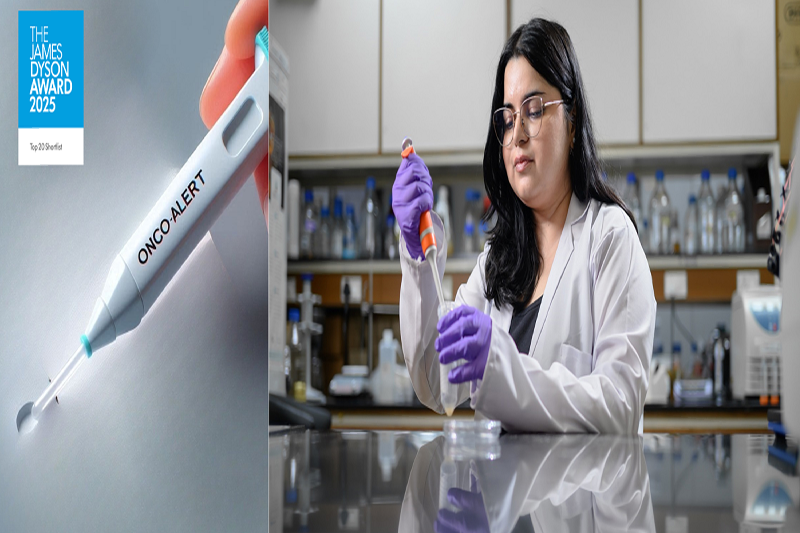
AI Water Sensor and Smart Keyboard for Parkinson’s Patients Win 2025 James Dyson Award: Innovation Meets Impact
Celebrating Ingenuity: The 2025 James Dyson Award Honors Student Innovators
The James Dyson Award 2025, one of the world’s most prestigious recognitions for young inventors, has unveiled its global winners — WaterSense and OnCue — two remarkable student-led innovations addressing critical challenges in sustainability and healthcare.
Now in its 20th year, the award received over 2,100 entries from 28 countries and regions, spotlighting the creative potential of young engineers and designers worldwide. Each global winner will receive Rs 31.5 lakh (£30,000) to further develop and scale their inventions.
Notably, this year also marked a historic milestone for India: OncoALERT, developed by Jayanti Kumari from the Translational Health Science and Technology Institute (THSTI) under the Department of Biotechnology, Government of India, became the first-ever Indian innovation to reach the global finals, showcasing India’s growing prominence in science-driven problem-solving.
WaterSense: An AI-Powered Solution to Combat Water Pollution
Winner in the Sustainability category, WaterSense represents a powerful intersection of artificial intelligence and environmental science. Created by Filip Budny, a Polish PhD candidate at the Warsaw University of Technology, the device is designed to autonomously monitor water quality in real time, providing an efficient and accurate alternative to conventional manual water testing methods.
Traditionally, water quality testing involves time-consuming manual sampling — a process prone to delays and inconsistencies. WaterSense changes that paradigm. Using AI-powered sensors, it can detect pollutants early, allowing for immediate corrective action and preventing large-scale ecological damage.
The innovation comes at a critical time — as global reports indicate that over 40% of the world’s rivers and lakes are severely polluted, threatening ecosystems and human health. Budny’s creation not only enhances monitoring efficiency but also contributes to sustainability goals by promoting cleaner water systems and better management of natural resources.
In his statement, James Dyson, founder of Dyson, praised the innovation:
“WaterSense demonstrates how engineering can be a force for good. By combining artificial intelligence with environmental science, Filip has created a tool that can make a tangible difference in global sustainability.”
OnCue: A Smart Keyboard Designed for Parkinson’s Patients
In the Medical category, OnCue, developed by Italian designer Alessandra Galli, emerged as the winner for its groundbreaking approach to assistive technology. Galli, an alumna of Delft University of Technology, designed the smart keyboard to help individuals living with Parkinson’s disease overcome challenges in everyday digital communication.
Unlike conventional medical devices, OnCue integrates visual and haptic cues—light signals and gentle vibrations—that help users manage tremors, freezing, and muscle stiffness, which are common motor symptoms of Parkinson’s. The device’s intelligent feedback system guides hand movement and rhythm, making typing smoother, more accurate, and less frustrating for patients.
OnCue is more than a tool—it’s an embodiment of empathy-driven design. By addressing both functionality and dignity, Galli’s innovation highlights the importance of inclusive technology that restores independence and confidence to users facing chronic conditions.
Dyson commended the human-centered approach of the invention:
“Alessandra’s OnCue reflects the true essence of design — solving real-world problems with empathy and creativity. Her innovation not only supports users physically but emotionally, helping them reconnect with digital life in a meaningful way.”
India’s OncoALERT: A Breakthrough in Early Cancer Detection
Adding to this year’s inspiring lineup was India’s first-ever global finalist — OncoALERT, an innovation by Jayanti Kumari from THSTI, Department of Biotechnology, Government of India.
OncoALERT focuses on early detection of oral cancer, a disease that continues to be one of India’s top public health concerns due to late diagnosis and limited screening access in rural areas.
This achievement is a milestone for Indian innovation on the global stage. OncoALERT’s selection as a global finalist reflects the nation’s growing participation in research-based design and technological problem-solving with real-world social impact.
Experts believe that the device could transform community-level cancer screening by making early detection affordable and accessible, particularly in low-resource settings. Its presence at the Dyson Awards underscores the role of Indian researchers and engineers in tackling global health challenges through science and innovation.
A Global Platform for Young Inventors
The James Dyson Award, launched in 2005, encourages university students and recent graduates in engineering and design to think beyond conventional limits and develop solutions to real-world problems. Over the past two decades, the competition has supported more than 400 student inventions globally, distributing over £1.5 million (approx. ₹15.6 crore) in prize money.
Beyond financial recognition, the award provides inventors with mentorship, exposure, and access to a global innovation network, enabling them to bring their prototypes closer to production. Many past winners have gone on to launch startups and patent technologies that now impact industries from healthcare to environmental management.
This year, the announcement was made through a virtual interaction with James Dyson, where both winners — Filip Budny and Alessandra Galli — were surprised with the news of their selection. The moment symbolized the spirit of innovation and resilience that defines the Dyson community.
Innovation That Shapes a Better Future
The 2025 edition of the James Dyson Award reaffirms the transformative role of youth-driven innovation in solving pressing global challenges. From combating water pollution to supporting individuals with neurodegenerative conditions, this year’s winners have shown that design and technology can serve humanity in profound ways.
WaterSense and OnCue are not just inventions — they represent hope, inclusivity, and sustainability. They remind the world that when creativity meets compassion, even the most complex problems can find intelligent, practical solutions.
As India’s OncoALERT steps into the global spotlight, it brings with it the promise of a new generation of Indian inventors committed to building tools that improve lives — not just locally, but globally.
The 2025 James Dyson Award stands as a celebration of the next wave of innovators — those who dare to think differently, question convention, and engineer a better tomorrow.



